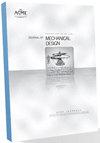General Adaptable Design and Evaluation Using Markov Processes
IF 2.9
3区 工程技术
Q2 ENGINEERING, MECHANICAL
引用次数: 0
Abstract
Facing the challenges posed by increasingly complex, dynamic, and unpredictable requirements, the design process is grappling with the critical issue of ensuring sustained product satisfaction amid changing demands. This paper introduces an approach for evaluating design adaptability, considering potential future requirements. Entropy serves as a crucial indicator to quantify design effort and the Markov process is employed to simulate potential requirement changes. The information contents of design requirements and design solutions are defined based on information entropy theory, and the design adaptability of a design candidate is evaluated by calculating the extra design effort for satisfying the design requirements, which is the difference in information content between the design candidate and design requirements. Moreover, a simulation method for requirement evolution is proposed, which integrates information entropy theory and the Markov process to accommodate potential future requirements. The general design adaptability of design solutions is then calculated based on conditional entropy, taking into account the evolving design requirements. Finally, the effectiveness of the proposed approach is validated through a case study involving the design and evaluation of a hybrid additive manufacturing (HAM) device.利用马尔可夫过程进行通用适应性设计和评估
面对日益复杂、动态和不可预测的需求所带来的挑战,设计过程正在努力解决在不断变化的需求中确保持续的产品满意度这一关键问题。本文介绍了一种考虑未来潜在需求的设计适应性评估方法。熵是量化设计工作的关键指标,马尔可夫过程被用来模拟潜在的需求变化。本文基于信息熵理论定义了设计要求和设计方案的信息含量,并通过计算满足设计要求所需的额外设计工作量(即候选设计与设计要求之间的信息含量差)来评估候选设计的设计适应性。此外,还提出了一种需求演化的模拟方法,该方法综合了信息熵理论和马尔可夫过程,以适应未来潜在的需求。然后,根据条件熵计算出设计方案的一般设计适应性,并将不断变化的设计要求考虑在内。最后,通过一个涉及混合增材制造(HAM)设备设计和评估的案例研究,验证了所提方法的有效性。
本文章由计算机程序翻译,如有差异,请以英文原文为准。
求助全文
约1分钟内获得全文
求助全文
来源期刊

Journal of Mechanical Design
工程技术-工程:机械
CiteScore
8.00
自引率
18.20%
发文量
139
审稿时长
3.9 months
期刊介绍:
The Journal of Mechanical Design (JMD) serves the broad design community as the venue for scholarly, archival research in all aspects of the design activity with emphasis on design synthesis. JMD has traditionally served the ASME Design Engineering Division and its technical committees, but it welcomes contributions from all areas of design with emphasis on synthesis. JMD communicates original contributions, primarily in the form of research articles of considerable depth, but also technical briefs, design innovation papers, book reviews, and editorials.
Scope: The Journal of Mechanical Design (JMD) serves the broad design community as the venue for scholarly, archival research in all aspects of the design activity with emphasis on design synthesis. JMD has traditionally served the ASME Design Engineering Division and its technical committees, but it welcomes contributions from all areas of design with emphasis on synthesis. JMD communicates original contributions, primarily in the form of research articles of considerable depth, but also technical briefs, design innovation papers, book reviews, and editorials.
 求助内容:
求助内容: 应助结果提醒方式:
应助结果提醒方式:


